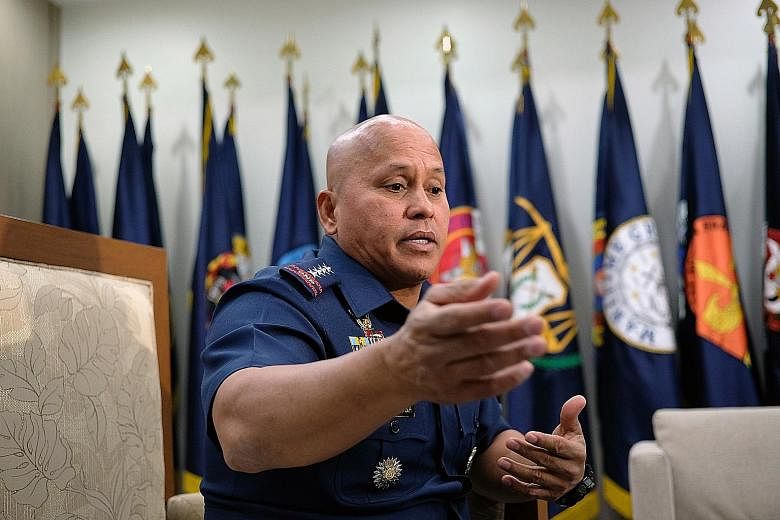MANILA • The chief enforcer of President Rodrigo Duterte's war on drugs has acknowledged the difficulty in halting a surge in methamphetamine imports from China despite a campaign that has claimed thousands of lives.
"We do not guarantee we will win this war," Philippine National Police chief Ronald dela Rosa said in an interview on Thursday. "Win or lose, at least we have done something to address the problem."
Mr Duterte has faced strident criticism from the US, United Nations and European Union since being sworn in last June over his efforts to tackle drug addiction - a policy that has proved popular at home.
The Philippine police say about 2,600 people have been killed in police operations against drug traffickers, while human rights groups label some 4,700 other murders as "extra-judicial killings".
In a speech on Thursday, Mr Duterte again rejected international criticism of the drug war, demanding the EU "not impose your, whatever it is, your values and everything because we hate you for being a hypocrite".
Despite being a key source of drugs, China has used the issue to draw closer to Mr Duterte and improve ties with the Philippines. Policymakers in Beijing have supported the drug war and offered to help, with anti-narcotic cooperation among deals reached during Mr Duterte's trip to China last year.
Mr Dela Rosa on Thursday said police in the Philippines are coordinating with their counterparts in China. Most of the five clandestine laboratories dismantled in Mr Duterte's first six months in office involved Chinese citizens, he added.
Recent data from the Drug Enforcement Agency shows the largest quantities of methamphetamine seized had been trafficked directly from China, said Mr Jeremy Douglas, regional representative of the UN Office on Drugs and Crime. Methamphetamine imports into the Philippines rose to 2,495kg last year, more than four times the amount in 2015, he said.
While better law enforcement had contributed to the rise seen in the data, other factors like treatment admissions, price and purity trends related to the drug indicated a growing demand for it in the Philippines, Mr Douglas said.
"As long as market demand is not addressed, increases in law enforcement activities at a street level alone won't be able to improve the situation. We recommend addressing the market through treatment and prevention, and addressing organised crime targeting those that run the business," he added.
Mr Dela Rosa, 55, rose from the police ranks in Davao City, where Mr Duterte served as mayor for more than two decades.
He said the campaign targeted both street-level pushing as well as high-value targets like drug lords and traffickers as well as financiers and protectors.
He rated the drug war a success on the basis that police so far had accounted for 1.3 million people involved in the narcotic trade across the country, around 70 per cent of 1.8 million target set by the Dangerous Drugs Board.
"On the demand side, we can say we have a passing grade of 70 per cent," Mr Dela Rosa said.
Another measure of success, he added, was that methamphetamine prices had almost quadrupled to as much as 4,000 pesos (S$110) a gram.
BLOOMBERG


